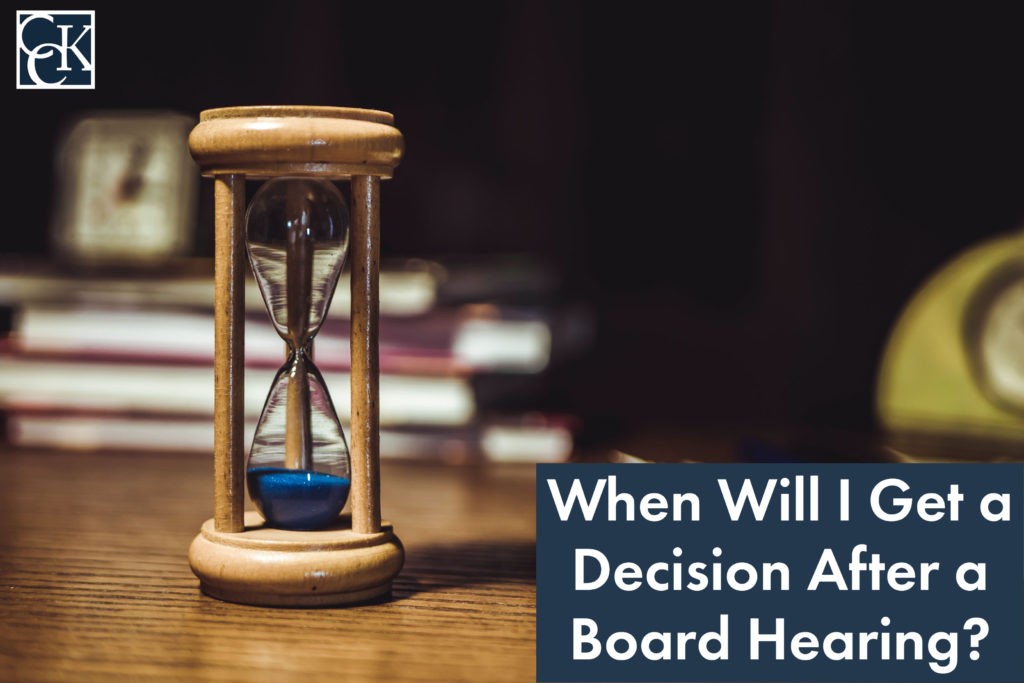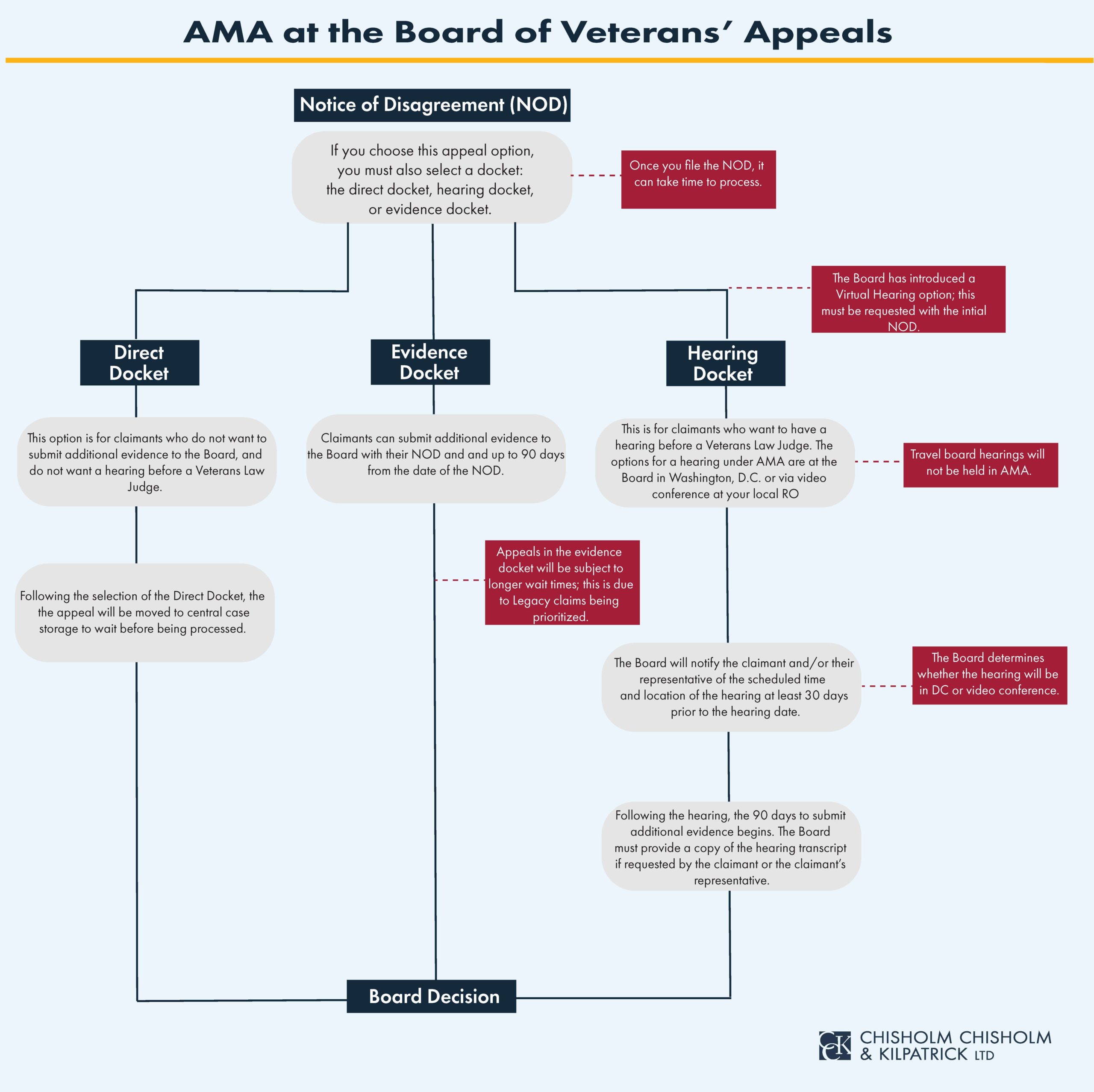How Long After a Board (BVA) Hearing Will I Get a Decision?

CCK Law: Our Vital Role in Veterans Law
What is the Board of Veterans’ Appeals?
The Board of Veterans’ Appeals is an entity that conducts hearings and decides claims for veterans’ benefits once they have been appealed from the agency of original jurisdiction, usually a VA Regional Office. The Board partakes in what is called “de novo review,” meaning a fresh look at a veteran’s case. The Board then makes a decision based on the evidence of record.
Importantly, when veterans file a Notice of Disagreement (i.e., appeal to the Board), they must choose from three dockets: (1) the direct docket, (2) the evidence docket, or (3) the hearing docket. When choosing the hearing docket, veterans will be able to discuss their claim at the Board and present new evidence for their case. Veterans do not have to participate in a hearing, as hearings are entirely optional, and the decision to request a hearing will depend on each individual’s case.
What is the “Hearing Docket” at the Board of Veterans’ Appeals?
The Appeals Modernization Act (AMA) developed three dockets for claimants to choose from when submitting a Notice of Disagreement. The hearing docket is for claimants who wish to have a hearing before a Veterans Law Judge. Hearings in the new appeals system will take place either at the Board in Washington, D.C. or via videoconference. Importantly, travel board hearings held by Veterans Law Judges at local Regional Offices will only be available to claimants in the Legacy appeals system. Overall, claimants are entitled to a hearing on any issue involved in an appeal.
What Evidence is Allowed During a Board Hearing?
Board hearings permit claimants to introduce into the records, in person, any available evidence which they consider relevant and any arguments or contentions that they deem pertinent to their VA disability claim. Additionally, claimants have the opportunity to produce witnesses, but the witnesses must be present for the hearing. The Board will then consider the following evidence before rendering its decision:
- The evidence of record at the time of the agency of original jurisdiction decision on the issue or issues on appeal;
- The evidence submitted by the claimant and/or their representative at the hearing, to include testimony at the hearing; and
- The evidence submitted by the claimant and/or their representative within 90 days following the hearing
- However, the Board will NOT consider evidence submitted by the claimant after the initial rating decision but before the hearing.
Types of Board of Veterans’ Appeals Hearings
Veterans should discuss whether they would like to request a hearing, and which type, with their legal representative or veteran service officer. However, there are advantages and disadvantages to the different types of hearings.
- Videoconference hearing – these types of hearings are usually quicker to schedule and more convenient for the veteran in terms of travel burden. They are typically scheduled more quickly because the hearing does not need to be worked around the VLJ’s travel schedule. These hearings will be scheduled at a local VA Regional Office, which can also lessen the veteran’s travel burden. Videoconference hearings are the same as those conducted in person in terms of structure and impact.
- In-person hearing in Washington, D.C. – This type of hearing has several downsides, two of the most notable being that they can take a very long time to schedule, and the veteran must pay for the cost of travel to Washington, D.C.

Board Hearing: Decision Timeframes and Delays
In general, requesting a Board hearing of any type will add significant delays to a veteran receiving a decision. In the Board Chairman’s 2017 Annual Report to Congress, the Board was said to have held 16,626 hearings during Fiscal Year 2017, and states, “for those appeals that were resolved by the Board, veterans waited, on average, seven years from the date they initiated their appeal until resolution.”
Appeals at the Board can take a long time to be resolved even without a hearing. Therefore, requesting a hearing does significantly increase the amount of time a veteran will wait for a decision. The timeframe listed above existed in the Legacy Appeals system (i.e., the old appeals system); however, wait times for decisions following Board hearings have not improved much under AMA.
As of 2019, there were over 100,000 appeals pending at the Board, between 60 and 70,000 of which include cases of veterans that are waiting for Board hearings in the Legacy system alone. VA has plans to prioritize the Legacy appeals cases and has proposed a timeline for meeting their goal.
Right now, VA’s aim is to resolve all non-remanded Legacy appeals by the end of 2020. Furthermore, VA states it wants to get rid of Legacy appeals altogether by 2022. Therefore, veterans who request a hearing under AMA are still experiencing the longest wait times as VA has given these cases last priority. That is, these veterans must wait for VA to process Legacy appeals and conduct Legacy hearings prior to having their hearings take place.
Initially, VA estimated veterans could wait from 3-5 years for a hearing under AMA. However, the number of hearings VA held in 2019 is up 38 percent from the previous year, which is a good sign for veterans. Moreover, the Board has already sent out over 100,000 decisions in Fiscal Year 2020, which indicates that appeals are being worked through at steadier rates than in the past.
You can find a tracker of the BVA backlog here and wait times other Veterans are experiencing here.
Will a Decision Be Made at My Board Hearing?
It is important for veterans to be aware that Veterans Law Judges will not make decisions on their appeals at the hearing. Instead, the Board reviews cases in the order they are received. The Veterans Law Judge will begin work on a veteran’s appeal when it is among the oldest appeals ready for their review.
The Board will create a transcript of the veteran’s hearing and add this to their file. The Board will ask the veteran if they would like a copy of the transcript for their personal records. The Judge will review the hearing transcript along with all the other evidence in the veteran’s file when they make a decision on the appeal.
About the Author
Share this Post

